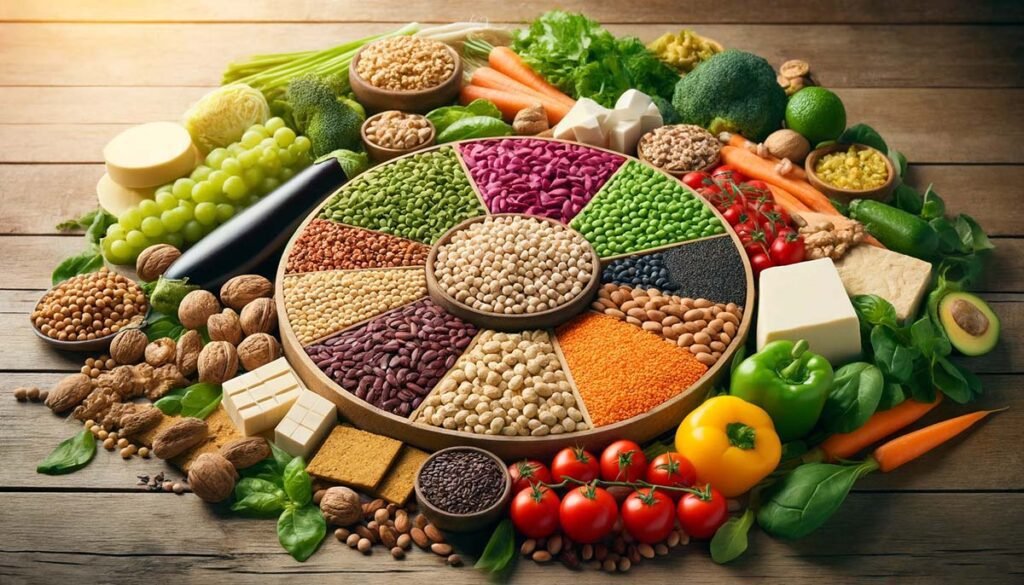A balanced diet is essential for overall health and well-being, and for many individuals, incorporating sufficient protein is a key component of this balance. While meat is a common source of protein, there are numerous vegetarian alternatives that provide ample protein while also offering additional health benefits. This guide delves into various vegetarian protein sources, their nutritional benefits, and how they can contribute to a well-rounded diet, aligning with the health-focused perspective of wellhealthorganic.com.
Why Choose Vegetarian Protein Sources?
Opting for vegetarian protein sources can offer several advantages, including:
- Health Benefits: Many plant-based protein sources are rich in fiber, vitamins, minerals, and antioxidants, promoting overall health and reducing the risk of chronic diseases.
- Environmental Sustainability: Plant-based proteins typically have a lower environmental impact compared to animal-based proteins, making them a sustainable choice.
- Dietary Diversity: Incorporating a variety of vegetarian protein sources diversifies the diet, ensuring a wide range of nutrients and flavors.
Common Vegetarian Protein Sources
1. Legumes
- Beans (e.g., black beans, chickpeas, kidney beans): Rich in protein, fiber, and essential nutrients like iron and folate.
- Lentils: High in protein and fiber, with a notable content of folate and potassium.
- Peas: Green peas and split peas provide protein, fiber, and vitamins A, C, and K.
2. Nuts and Seeds
- Almonds: High in protein, healthy fats, vitamin E, and magnesium.
- Chia Seeds: Rich in protein, omega-3 fatty acids, fiber, and antioxidants.
- Flaxseeds: Provide protein, omega-3 fatty acids, and lignans, which have antioxidant properties.
- Pumpkin Seeds: Good source of protein, iron, magnesium, zinc, and antioxidants.
3. Quinoa
- A complete protein containing all nine essential amino acids, along with fiber, vitamins, and minerals like magnesium and phosphorus.
4. Tofu and Tempeh
- Tofu: Made from soybeans, tofu is versatile, high in protein, and contains essential amino acids, iron, and calcium.
- Tempeh: Fermented soybean product that is high in protein, fiber, and various nutrients including probiotics.
5. Whole Grains
- Oats: Provide protein, fiber, and various vitamins and minerals, including manganese and phosphorus.
- Brown Rice: Contains protein, fiber, and essential nutrients like magnesium and selenium.
- Quinoa: Mentioned earlier as a complete protein, quinoa is also a nutritious whole grain.
6. Dairy and Dairy Alternatives
- Greek Yogurt: High in protein and probiotics, beneficial for gut health.
- Milk Alternatives (e.g., almond milk, soy milk): Fortified with protein, calcium, and vitamins, suitable for those avoiding dairy.
7. Vegetables
- Broccoli: Contains protein, fiber, vitamins C and K, and various antioxidants.
- Spinach: Good source of protein, iron, vitamins A and C, and folate.
- Brussels Sprouts: Provide protein, fiber, vitamins C and K, and antioxidants.
Tips for Incorporating Vegetarian Protein Sources
- Mix and Match: Combine different protein sources throughout the day to ensure a variety of nutrients.
- Snack Wisely: Opt for protein-rich snacks like nuts, seeds, or yogurt to curb hunger and maintain energy levels.
- Explore Recipes: Experiment with new recipes that feature vegetarian protein sources as the main ingredient or as a complement to other dishes.
OVERVIEW OF VEGETARIAN PROTEIN SOURCES

A Diverse Array of Options
Vegetarian diets offer protein-rich foods that meet nutritional needs without relying on animal products. These diverse sources include legumes, nuts, grains, and soy-based products. Each category provides unique health benefits and can be incorporated into various culinary practices, ensuring nutritional adequacy and variety.
Key Categories of Vegetarian Proteins
- Legumes: Including beans, lentils, and chickpeas, these are rich in protein and fiber, supporting digestive health and satiety.
- Nuts and Seeds: Almonds, walnuts, chia seeds, and flaxseeds are excellent sources of protein and healthy fats.
- Grains: Quinoa is a complete protein, offering all nine essential amino acids.
- Soy Products: Tofu and tempeh are versatile and nutrient-dense options, popular in many vegetarian dishes.
- Dairy and Plant-Based Alternatives: For dairy consumers, products like Greek yogurt are protein-rich, while plant-based milk and protein powders offer convenient alternatives.
By exploring these categories, you can ensure a balanced and enjoyable vegetarian diet rich in protein and other essential nutrients.
LEGUMES – NUTRITIONAL POWERHOUSES
Legumes, a staple in many vegetarian and vegan diets, are among the most nutrient-dense foods available. This category includes beans, lentils, and chickpeas, all offering significant health benefits. These plant-based proteins are high in protein and rich in essential nutrients such as fiber, vitamins, and minerals.
Nutritional Profile of Legumes
Legumes are celebrated for their impressive protein content. For example, chickpeas provide about 19 grams of protein per 100 grams, while lentils offer approximately 18 grams per 100 grams. Depending on the variety, beans can range from 15 to 25 grams of protein per 100 grams. In addition to protein, legumes are high in dietary fiber, which supports digestive health and helps maintain a healthy weight by promoting a feeling of fullness.
Health Benefits of Legumes
Legumes’ high fiber content helps regulate blood sugar levels, making them an excellent choice for individuals with diabetes or those looking to manage their weight. Combining protein and fiber also contributes to a lower risk of heart disease by reducing cholesterol levels. Legumes are rich in essential vitamins and minerals, including iron, magnesium, potassium, and folate, crucial for overall health and well-being.
Culinary Uses and Versatility
One of the most appealing aspects of legumes is their versatility in the kitchen. They can be used in various dishes, from soups and stews to salads and veggie burgers. Here are a few popular culinary uses:
- Chickpeas: Ideal for making hummus, adding to salads, or roasting for a crunchy snack.
- Lentils: Perfect for hearty soups, stews, and Indian dals.
- Black Beans: Commonly used in Mexican cuisine, excellent in burritos, tacos, and as a base for veggie burgers.
- Kidney Beans: Great for chili, casseroles, and mixed with rice dishes.
Examples and Specific Protein Content
To illustrate the protein content, consider these examples:
- Chickpeas: 19 grams of protein per 100 grams.
- Lentils: 18 grams of protein per 100 grams.
- Black Beans: 21 grams of protein per 100 grams.
- Kidney Beans: 24 grams of protein per 100 grams.
By incorporating legumes into your diet, you can enjoy their nutritional benefits while exploring a variety of delicious and satisfying dishes. These nutritional powerhouses are a cornerstone of vegetarian and vegan diets, providing essential nutrients and promoting overall health.
NUTS AND SEEDS – COMPACT NUTRIENT SOURCES
Nuts and seeds are convenient and tasty snacks and pack a powerful nutritional punch. These small but mighty foods are rich in protein, healthy fats, vitamins, and minerals, making them essential to a balanced vegetarian diet. Including nuts and seeds in your meals can help meet your daily protein needs while providing numerous health benefits.
Nutritional Profile of Nuts and Seeds
Nuts and seeds are celebrated for their high protein content. For example, almonds contain about 21 grams of protein per 100 grams, while walnuts offer around 15 grams per 100 grams. Chia seeds are particularly impressive, providing approximately 18 grams of protein per 100 grams, and hemp seeds boast an even higher protein content of about 31 grams per 100 grams. These foods are also excellent sources of healthy fats, particularly omega-3 and omega-6 fatty acids, crucial for heart health and brain function.
Health Benefits of Nuts and Seeds
In addition to being protein-rich, wild seeds offer numerous health benefits:
- Heart Health: The healthy fats in nuts and seeds can help reduce LDL cholesterol levels, lowering the risk of heart disease.
- Weight Management: The combination of protein, fiber, and healthy fats helps promote satiety and reduce overall calorie intake.
- Nutrient Density: Nuts and seeds contain essential vitamins and minerals, including vitamin E, magnesium, zinc, and selenium, which support immune function, bone health, and antioxidant defense.
Culinary Uses and Versatility
Nuts and seeds are incredibly versatile and can be incorporated into various dishes:
- Almonds: Enjoy raw as a snack, add to salads, or blend into almond butter.
- Walnuts: Perfect for baking, adding to cereals, or using in savory dishes like walnut pesto.
- Chia Seeds: Ideal for making chia pudding, adding to smoothies, or using it as an egg substitute in baking.
- Hemp Seeds: Sprinkle on top of salads and yogurt or incorporate into protein bars.
- Flaxseeds: Ground flaxseeds can be added to oatmeal smoothies or used in baking for a nutritional boost.
Examples and Specific Protein Content
To highlight their protein content, consider these examples:
- Almonds: 21 grams of protein per 100 grams.
- Walnuts: 15 grams of protein per 100 grams.
- Chia Seeds: 18 grams of protein per 100 grams.
- Hemp Seeds: 31 grams of protein per 100 grams.
Incorporating a variety of nuts and seeds into your diet can provide a significant nutritional boost. These compact nutrient sources are convenient and delicious and contribute to a well-rounded and protein-rich vegetarian diet. By exploring different types of nuts and seeds, you can enjoy their diverse flavors and textures while reaping their numerous health benefits.
Conclusion
Choosing vegetarian protein sources not only supports a balanced diet but also promotes overall health and well-being. By incorporating a variety of plant-based proteins into meals and snacks, individuals can meet their daily protein needs while enjoying diverse flavors and nutritional benefits. Whether you’re following a vegetarian diet or simply seeking healthier alternatives, exploring these protein sources can enhance your culinary repertoire and contribute to a sustainable lifestyle.
